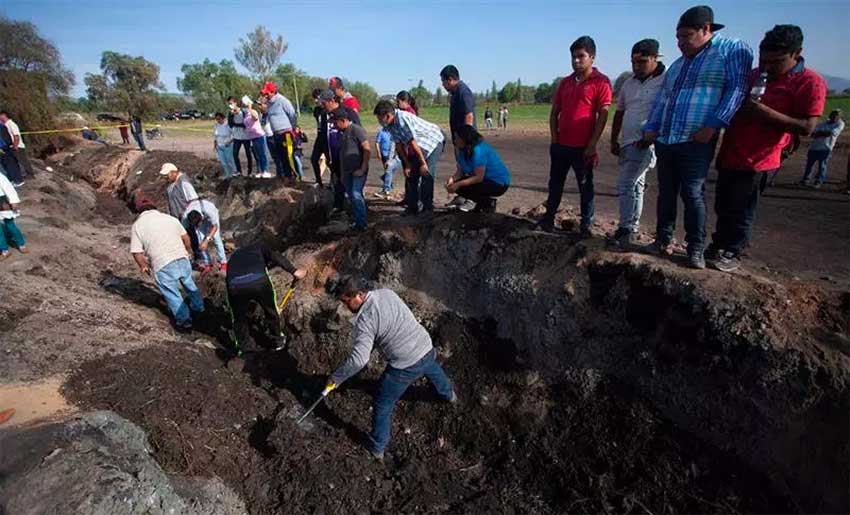When gasoline started gushing out of a punctured pipeline in a field in Tlahuelilpan, Hidalgo, on Friday afternoon, word spread quickly.
Hundreds of local residents rushed to the rupture with containers in hand, determined to get some free fuel as gasoline shortages continued to make the commodity hard to come by.
Hours later, amid an atmosphere that has been described as festive, the pipeline exploded, a huge fire spread across the field and more than 100 people were engulfed in flames. At least 95 people lost their lives and more than 40 others remain in hospital with severe burns.
In the days since the tragedy, a debate has raged across the country.
Were the victims who flocked to the illegal pipeline tap out-and-out criminals, or were they merely desperate opportunists whose actions were influenced both by the gasoline shortages afflicting Hidalgo and their own precarious economic situations?
Even President López Obrador weighed in on the debate, rejecting the former view and arguing that people’s poverty had compelled them to get in on the act.
“We have the conviction that the people are good, that they are honest, that if they arrived at these extremes, these practices, it’s because they were completely abandoned” by past governments, he told reporters at a press conference last weekend.
Poverty has long afflicted Tlahuelilpan, a municipality around 120 kilometers north of Mexico City, but according to many local residents, the situation has got even worse over the past two years.
According to the social development agency Coneval, 55% of Tlahuelilpan’s 18,531 residents live in poverty and 7% are in situations of extreme poverty.
The economic means of almost a quarter of all residents are so limited that they find it extremely difficult to buy enough food to have three meals a day, statistics show.
Education levels are low – only three in 10 residents have finished middle school – and more than 70% of people don’t have a formal job, meaning they don’t have access to social security services and other employment benefits.

More than 10% of homes in Tlahuelilpan lack basic services such as running water, electricity and adequate drainage and many have only dirt floors. Almost half the municipality’s houses are without a washing machine and a quarter have no fridge.
The situation leaves little doubt in the mind of Tlahuelilpan Mayor Juan Pedro Cruz that poverty was to blame for people’s reckless decision to get so close to the geysers of gasoline last Friday and place themselves in a position of such obvious risk.
Ernesto Cardenas, a writer who chronicles the life and times of Tlahuelilpan, agrees.
But he also points his finger at Pemex, alleging that while poverty is the main culprit in the tragedy, the state oil company has played a role in exacerbating it.
More than 40 years ago, Pemex opened the Miguel Hidalgo oil refinery in Tula, a municipality just 15 kilometers from Tlahuelilpan. But Cardenas contends that the refinery has brought few benefits to the local townsfolk.
“They came, according to them, to create jobs but as the campesino [small-plot farmer] wasn’t prepared, they started to bring their own people. We made an effort to gain access to a job and many people went for training. We were ready but in the end, they didn’t give us an answer, they just brought their own unionized workers,” he said.
In recent years, the municipality’s economy has become increasingly dependent on fuel theft, known colloquially as huachicoleo, as more and more residents looked for a way to lift themselves out of poverty.
Before huachicoleo, Contreras said, Tlahuelilpan’s economy was based on agriculture, especially the cultivation of crops such as alfalfa, wheat and corn.
But residues from the nearby refinery contaminated the fields, he explained, and with gasoline prices rising, many people – especially young men – saw a lucrative alternative in the tapping of Pemex pipelines and the sale of stolen fuel.
“I got into the business two years ago. I needed money and as a farmhand or farmer, I wouldn’t have been able to get out of poverty,” an unnamed young huachicolero, or fuel thief, told the newspaper Milenio.
He explained that from a young age, he tried to earn an honest living in a range of different, poorly-paid jobs but unable to make ends meet, he accepted an offer from a friend to get in on the illegal fuel theft racket.
In January 2017, when the federal government imposed a sharp increase in the price of gasoline, many others also decided to join the illegal business, the huachicolero recalled.
“In the beginning, we only sold it [the stolen fuel] here but the competition has grown a lot and for that reason we took it to other municipalities. It’s a profitable business because we sell the stolen fuel at six pesos a liter and the reseller sells it at 12. Everybody wins. On a normal day I used to take home 10,000 or 12,000 pesos [US $520 to $630],” he said.
But now, the federal government has made cracking down on fuel theft a priority, threatening the livelihoods of huachicoleros all over the country but especially in states such as Hidalgo, Puebla and Guanajuato, which led the country in illegal taps in 2018.
Source: Milenio (sp)
